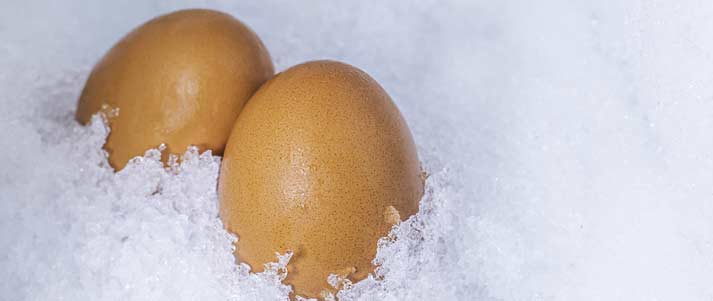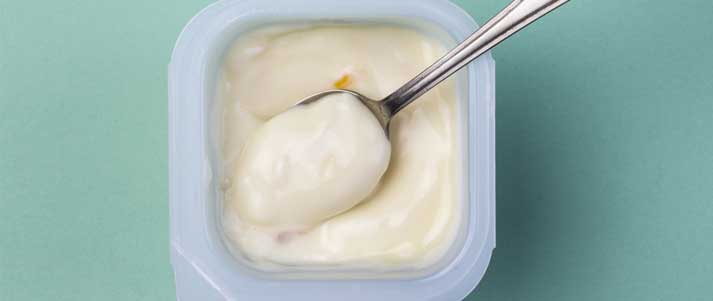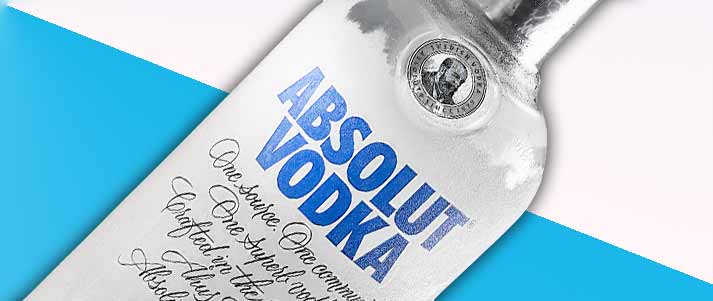18 surprising foods you can (and can’t) freeze
Buying in bulk and stocking up the freezer can be a great way to save money on food. But what foods can you freeze, and what can't you freeze?

Credit: aSuruwataRi (background), Roman Samborskyi (woman), Andrey Lobachev (vodka), Tim UR (tomato), Art_rich (bananas), Luis Carlos Torres (bread) – Shutterstock
There's a reason why you usually have to fight for freezer space in every student house – not only is frozen food usually cheaper than fresh produce, but freezing leftovers can make a meal go further and help massively with your weekly meal prep.
Of course, it's not just leftovers and peas that can go in the freezer. You can freeze a whole host of foods, and it won't even affect how they taste (as long as you store them properly).
And by the same token, there are a few foods that will die a horrible death if you put them in the freezer. So we've saved you the hassle (and potential money-wasting) of testing what works and what doesn't by putting them in this handy guide for you.
What food can you freeze?
Here are some common foods you can freeze and some that you shouldn't put in the freezer:
-
Can you freeze cookies and other baked goods?
Yes, you can freeze cookies, cakes, flapjacks and other baked goods.
If you're ever in the rare position of having leftover cake, flapjacks, muffins or cookies, don't worry – you can freeze cake and other baked goods!
Just wrap up your tasty treats in cling film and throw them in the freezer, and then when you're feeling peckish you can defrost them in the microwave.
Amazingly, you can freeze unbaked scones, too. Simply make your dough, separate into scone-shaped portions and (again) freeze them in cling film.
Anytime you fancy a scone, remove the dough from the freezer and pop it in the oven – it'll still rise as though you made the dough fresh that morning.
-
Can you freeze milk?
Yes, you can freeze milk.
Milk can be frozen and stored for months, which is useful if you ever want to bulk buy a few litres of milk and won't be able to consume it all within a few days.
All you have to do is make sure the bottle has a couple of inches of space for the milk to expand into, otherwise it'll end up bursting through the lid or causing the container to crack.
And the good news is that this is the same for non-dairy milk. You can freeze coconut, almond, soy, oat and other types of milk as well.
You can store your milk in the freezer for up to three months, and you should give it a day to defrost slowly in the fridge before consuming.
-
Can you freeze cheese?

Credit: Angelina Babii – Shutterstock
Yes, you can freeze cheese.
In theory, you can freeze any type of cheese, but we'd recommend grating it first for the best results.
As long as you keep the grated cheese in an airtight bag or container, it won't clump together as there'll be a limited amount of moisture to freeze it together.
Put some of your cheese on a homemade sandwich in the morning and it'll defrost by lunchtime, or sprinkle some on a plate of hot pasta for it to melt all over your dinner.
However, don't freeze a whole block of cheese as all the emulsifiers will separate and you'll be left with smelly, crumbly cheese.
-
Can you freeze jelly?
No, you cannot freeze jelly.
While you may not have had jelly by itself since you were a kid, some of the very best desserts contain jelly, so it's definitely worth mentioning here.
Sadly, however, you can't freeze jelly. We won't go into the scientific specifics of it all, but essentially the chemical bonds that make gelatin are broken when you freeze jelly, meaning it becomes a liquid mess when you defrost it.
Worse still, this means that desserts that contain jelly, like trifle, also shouldn't be frozen, as they're likely to spoil in the freezer.
On the plus side, if you are planning to just eat jelly by itself, it's usually packaged as several smaller cubes of gelatin that last ages. This means that whenever you fancy a little nostalgic treat, you only ever have to use as much gelatin as you need.
-
Can you freeze bananas?
Yes, you can freeze bananas.
You can freeze bananas in pretty much any state and for pretty much any purpose.
If they're starting to go brown, pop them in the freezer whole with the skin on. You can then defrost your bananas later to use for smoothies or banana bread, or you could just mush them up and put them in porridge.
You can also use frozen bananas as a healthy alternative to ice cream. Coat them in melted dark chocolate before freezing for a sweet snack that will actually be great brain food for when you're revising.
-
Can you freeze berries?
Yes, you can freeze berries.
Strawberries, raspberries, blackberries – whatever your favourite is, the fact remains: you can freeze berries, and there's no real reason not to buy them frozen in the first place!
Aside from the fact that it's totally safe to freeze and eat berries, it's also much cheaper too. For example, a 400g bag of frozen strawberries and blueberries will set you back £2.40* at Tesco (£6 per kg). Fresh blueberries, however, cost £3 for 250g (£12 per kg!).
And, bearing in mind that frozen berries will last a lot longer than fresh ones, you'll no doubt be wondering why you haven't been buying the icy cold equivalent for years now.
Frozen berries taste particularly amazing in smoothies and fresh juices, and mixing them frozen into porridge is a winner every time. Don't worry if you think they'll be too hard to mix in – the extra water in a frozen berry means they break down easily into the porridge for a great taste and texture.
* Prices correct at the time of writing.
-
Can you freeze eggs?

Credit: TON XAYYASONE – Shutterstock
Yes, you can freeze eggs.
Eggs don't have an extremely long shelf life, so many people avoid buying them in bulk. But while they can't be stored for long in their shells (even if you boil them they're only good for a few hours), you can freeze eggs if you crack and store them properly (i.e. not like in the picture above!).
The best way to store eggs in your freezer is to crack each one individually into a plastic egg container or muffin tin. Once they're frozen you can pop them out of the container and put them in the freezer as little blocks in a bag, where they can be stored for up to a year.
You can use frozen eggs for baking, omelettes, scrambled egg, french toast – in fact, the only thing that's off the cards would be separating them after they thaw. That's pretty much impossible.
You can also put most cooked egg products in the freezer too, meaning you can freeze things like omelettes and scrambled eggs – perfect if you're in a rush in the morning.
Oh, and before we move on from eggs... did you know that they're actually best kept in the fridge?
-
Can you freeze garlic?
Yes, you can freeze garlic.
It's always annoying when supermarkets only sell garlic in three-bulb packs, making it almost impossible to get through the cloves before they start sprouting green left, right and centre.
Thankfully, though, you can freeze garlic. Just put your bulbs in an airtight bag or tub to keep moisture out, then break off as many cloves as you want as and when you need them.
If you've already sliced the garlic, don't worry – it'll keep in the freezer in some olive oil (olive oil doesn't completely freeze so you can pick the pieces out when you need them).
-
Can you freeze bread?
Yes, you can freeze bread.
The fact that you can freeze bread may not come as a surprise to a lot of students, but we felt it had to be included as anyone missing out on this nugget of info could be wasting a lot of money.
All you need to do is put your loaf of sliced bread in the freezer before it starts to go mouldy, and then you'll be able to take it out slice-by-slice, as and when you need it.
Bread should only take about an hour or so to defrost, or if that's too long for you, pop the slice straight into the toaster for perfect crunchy toast.
-
Can you freeze grapes?
Yes, you can freeze grapes.
It's absolutely fine to put grapes in the freezer, and we'd even go as far as to argue that frozen grapes are actually more enjoyable to eat.
First off, you can use frozen grapes as an alternative to ice cubes. They'll add flavour to your drink and will work a treat if you're trying to cool down white wine as, unlike regular ice cubes, they won't make the drink go watery.
But our favourite use for frozen grapes is just to eat them whole. Their taste and texture are exactly like eating little grape flavoured ice lollies, with the only difference being that they're much healthier.
-
Can you freeze yoghurt?

Credit: Madele – Shutterstock
No, you can't freeze yoghurt.
Despite the name of a famous sweet treat, you can't freeze yoghurt – at least not all yoghurt, anyway.
Thinner yoghurts are more likely to be destroyed if you put them in the freezer, as aside from separating and becoming watery, they can also develop an acidic taste.
If you're really keen to freeze yoghurt, it's worth going for one that's creamier and full-fat (like Greek yoghurt) – just be warned that it'll still lose its smooth texture if you try to defrost it to enjoy as regular yoghurt again.
And if you're reading all of this to find out how to make your own frozen yoghurt, we've got bad news for you: even sticking full-fat yoghurt in the freezer won't recreate the well-loved light alternative to ice cream.
Frozen yoghurt is made in a special way that makes sure that the water doesn't crystalise, so you'll really struggle to make it at home.
-
Can you freeze potatoes?
Yes, you can freeze potatoes, but only when (partially) cooked.
Oh, the potato. One of the most versatile foods around and, luckily, it's also possible to freeze them. Just remember that they should be partially or fully cooked before you pop them in the freezer. Raw potatoes contain a lot of water and, when that water freezes, the potato becomes mushy.
Boiled potatoes or roast potatoes should be cooled before being frozen, but after that, you can simply put them in a bag and then into the freezer. When freezing mashed potato, it's best to spread it out as flat as possible in an airtight bag. Once frozen, you can store your potatoes in the freezer for up to three months.
Keep in mind that while it's totally fine to freeze boiled, mashed or roast potatoes, you shouldn't freeze potato salad if it contains mayonnaise. Mayonnaise is quite a temperature-sensitive ingredient and freezing it will mess with the texture and taste. You can keep potato salad in the fridge for a few days though, so that may be a better option if you have leftovers.
-
Can you freeze herbs and chillies?
Yes, you can freeze herbs and chopped up chillies.
The fact that you can put chilli and herbs in the freezer is infinitely helpful, as it's so difficult to find small amounts of either in the supermarket.
Our top tip for freezing chilli and herbs is to chop up your fresh leftovers and pour them into an empty water bottle. As long as you screw the lid back on there shouldn't be any moisture in there, meaning the contents won't get freezer burn and you'll be able to add them to meals for the extra kick of flavour you're after.
Oh, and you can use the same technique to freeze spring onions (salad onions) and ginger, too!
-
Can you freeze pasta?
Yes, you can freeze pasta.
As with bread, it won't be a huge surprise to a lot of you that you can freeze pasta, but it's worth mentioning in case you're unaware of this age-old student life hack.
Now, of course, we're talking about freezing cooked pasta here – dry pasta lasts forever and you needn't worry about having to put it in the freezer. And yes, you can freeze cooked pasta in its sauce and everything.
Whether you're cooking spaghetti, penne, lasagne or any other type of pasta, it's best to make sure it's cooked al dente (still slightly chewy), as soft pasta stands less of a chance of surviving the reheating process.
So, next time you're cooking a lasagne or one of our super-simple (but delicious) pasta dishes, don't be afraid to make a big batch – it's not only cheaper to cook in bulk, but as we've discovered, it's completely safe to freeze the pasta too.
-
Can you freeze alcohol?

Credit (foreground): Michael Stein 121272 – Shutterstock
Yes, you can freeze some types of alcohol.
Although it's pretty uncommon to start a bottle of wine and leave it unfinished, it can happen – and, annoyingly, wine goes off pretty quickly once it's opened.
The good news is that you can freeze wine, and it works best with wines that taste better chilled (like white or rosé). Wine snobs will say you can only use it for cooking once it's defrosted, but we'd drink it!
Note that you can also put most spirits in the freezer to keep them nice and cool. As these have a higher alcohol content they won't actually freeze, but just go a bit thicker than normal.
Some drinks freeze better than others, of course, so it's worth Googling before you ice them – but once you've had vodka from the freezer, you'll never look back.
Your freezer isn't just good for keeping your food ice cold – find out how it can be a massive help in keeping cool in the heat -
Can you freeze beer?
No, you can't freeze beer.
Ok, we get it, this alcohol chat is digressing a bit from the whole 'food' freezing thing – but we're sure you'll agree it's just as important. As mentioned in the previous point, you can only freeze certain types of alcohol, and unfortunately, beer isn't included.
We all love a cold beer with some friends, but believe us when we say that you cannot freeze beer. We repeat: do not put beer in the freezer.
Beer freezes quickly and expands as it does so. This means that you could end up with exploded beer ice everywhere, a potentially broken freezer and, in the case of beer bottles, shards of glass all over the shop.
Not only will you have lost all your precious brew, but the smell will linger for ages and make you puke whenever you go near the freezer with a hangover.
-
Can you freeze salad greens?
No, you can't freeze salad greens.
Unlike booze, there's a good chance you'll open a pot of salad and fail to finish it in one go. Unfortunately, you can't freeze salad as the water content of the vegetables is so high. This can cause freezer burn, which makes veggies inedible.
This is the case with cucumbers, tomatoes, radishes, lettuce and other salad vegetables, but note that you can freeze some of these if you don't intend to use them for salads.
Some can be used if you only intend to use them for cooking and flavouring, so have a quick Google for your specific veg if you're unsure. And just remember that you can freeze some types of salad, including our delicious bean salad.
-
Can you freeze butter?
Yes, you can freeze butter.
Butter is essential for both cooking and baking, so you may want to stock up on it. But rather than throwing out butter that’s close to its best-before date, you can freeze it.
The easiest way to freeze butter is to keep it in the original packing, but you can also put it in a freezer-safe bag or container.
Once frozen, you can keep unsalted butter in the freezer for around six months (salted butter can last up to a year).
When you want to use it again, you can either use it frozen or pop it in the microwave for a few seconds on each side. Easy-peasy!
Next stop: find out what foods you can eat past their best-before dates.








